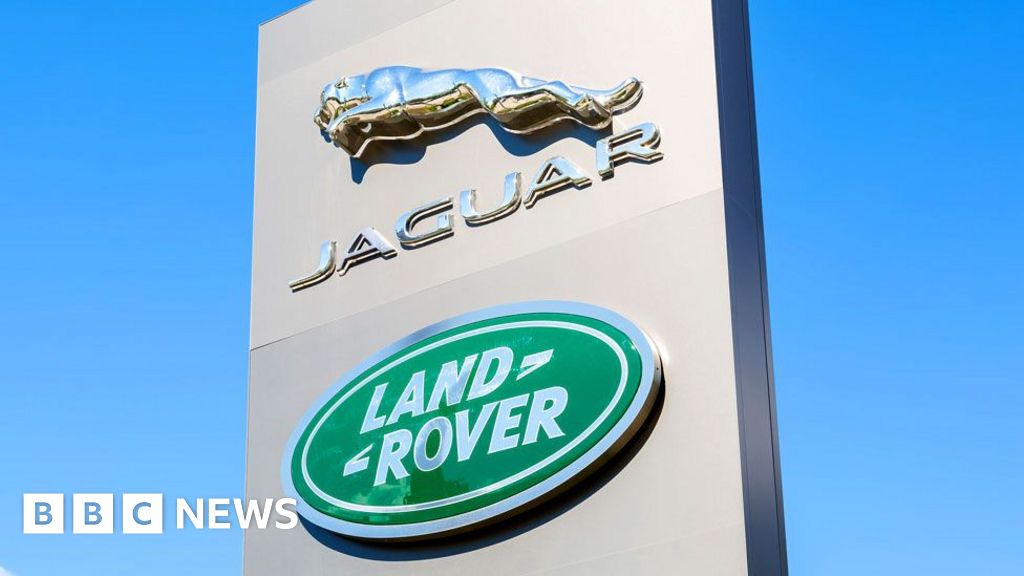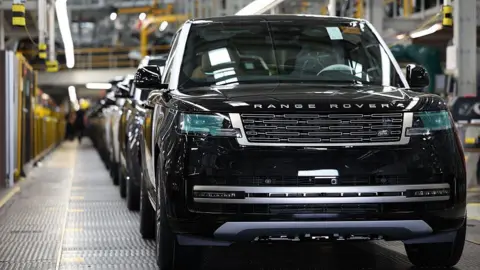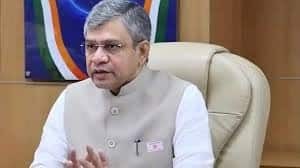Business
Jaguar Land Rover to resume some manufacturing after cyber-attack

Theo Leggettbusiness correspondent and
Rachel Clunbusiness reporter
 Getty Images
Getty ImagesJaguar Land Rover has said it will resume some production in the “coming days” after a cyber-attack forced the carmaker to suspend operations.
Work at its three UK facilities in the West Midlands and Merseyside were halted on 1 September after a cyber-attack the night before.
The BBC understands manufacturing will resume first at the engine facility in Wolverhampton on 6 October, and production at other plants will have a phased return.
A JLR spokesperson said: “Today we are informing colleagues, retailers and suppliers that some sections of our manufacturing operations will resume in the coming days.”
Industry sources said they expect it to still be several weeks before the production lines are running at full capacity.
In a note to JLR staff on Monday, the company said the “foundational work of our recovery programme is firmly underway”, and the phased restart was to ensure IT systems were brought back in a “safe and secure manner”.
Previously, the company had said it did not expect production to resume at its facilities until 1 October at the earliest.
The spokesperson said JLR was continuing work on its recovery following the shutdown.
“We continue to work around the clock alongside cybersecurity specialists, the UK government’s National Cyber Security Centre and law enforcement to ensure our restart is done in a safe and secure manner,” they said.
Phased restart
Companies in JLR’s supply chain, which has been under huge financial pressure as a result of the stoppage, have welcomed the news.
Many smaller companies in particular were thought to be at risk of bankruptcy.
About 30,000 people are directly employed at the company’s UK plants in Solihull, Wolverhampton and Halewood, and about 100,000 work for firms in the supply chain.
Some of these firms supply parts exclusively to JLR, while others sell components to other carmakers as well.
One supplier told the BBC the news that the restart was welcome and would provide some relief for businesses that rely on orders from JLR, but insisted that the losses already caused meant that financial assistance was still badly needed.
The supplier warned that vulnerable firms could not afford to take on more debt.
Over the weekend the government announced it would provide loan guarantees worth £1.5bn for JLR, with the stipulation that the supply chain would be supported.
Speaking at the Labour Party conference in Liverpool, Chancellor Rachel Reeves said the loan would “provide certainty” and “support for the jobs in its business and its supply chain”.
Sources within JLR itself have pointed out that the funding will be used to support suppliers with which it has a direct relationship, to ease cashflow and help pay for parts orders. It will be up to those businesses to pay their own suppliers.
The JLR spokesperson said the company thanked everyone connected to the manufacturer “for their continued patience, understanding and support.”
The spokesperson continued: “We know there is much more to do but the foundational work of our recovery is firmly underway, and we will continue to provide updates as we progress.”
JLR is one of several UK companies that have been hit in a spate of cyber-attacks this year.
Luxury department store Harrods was contacted by hackers this week after data related to 430,000 customer records was stolen in an IT breach.
That breach was separate to attempts to hack into separate Harrods systems earlier this year.
The group of Hackers that claimed responsibility for that attempt has also claimed responsibility for hacks on retailers M&S and Co-op, which have cost the companies hundreds of millions of pounds in lost sales.
Business
Video: How ICE Is Pushing Tech Companies to Identify Protesters

new video loaded: How ICE Is Pushing Tech Companies to Identify Protesters
By Sheera Frenkel, Christina Thornell, Valentina Caval, Thomas Vollkommer, Jon Hazell and June Kim
February 14, 2026
Business
52 reforms in 52 weeks: Ashwini Vaishnaw outlines massive railway overhaul for 2026

Indian Railways has reached a global milestone in freight operations, securing its position as a premier international logistics hub. Union Minister for Railways, Ashwini Vaishnaw, announced today that the national carrier has achieved an unprecedented scale in its logistics division. Highlighting this achievement, the Minister stated, “Indian Railways has become the second-largest cargo carrier in the world.”
Building on this momentum, the Ministry has prepared a rigorous roadmap for the upcoming year aimed at systemic transformation. The government plans to roll out a series of weekly initiatives to modernise every facet of rail travel and transport. Vaishnaw explained the structured timeline, saying, “For 2026, Railways has resolved to implement 52 reforms in 52 weeks.”
The initial phase of this plan will prioritise the passenger experience, with a focus on improving the quality of onboard facilities. The Minister identified the primary starting point for this year-long agenda, noting, “The first reform is better onboard services in Railways.”
In addition to passenger amenities, the government is placing strong emphasis on the “Gati Shakti” initiative to streamline the nationwide movement of goods. This strategic focus is designed to strengthen the country’s supply chain. Vaishnaw confirmed the freight sector’s priority, adding, “The second concerns ‘Gati Shakti Cargo.’”
A cornerstone of the 2026 agenda is a comprehensive overhaul of sanitation and hygiene standards. The Ministry has developed a new blueprint to ensure that the rail network’s cleanliness meets global benchmarks. Detailing the specifics of the first major initiative, the Minister remarked, “Reform number one for 2026 will ensure proper end-to-end cleaning of the Railways… The concept of a clean rail station has been established.”
This cleanliness drive is not a short-term measure but a multi-year commitment to cover the entire Indian Railways fleet. The implementation will be phased to ensure thoroughness and consistency. Vaishnaw clarified the timeline, stating, “Over three years, this reform will be implemented across all trains.”
To ensure the success of these reforms, the Ministry is introducing a robust accountability framework. These measures will include performance-based contracts and the integration of modern digital tools to monitor progress in real time. Emphasising the shift towards professional and technology-driven management, the Minister concluded, “There will be clearly defined service-level agreements… There will be extensive use of technology.”
Business
BrewDog owners say craft beer company could be sold off

Craft beer brand BrewDog could be sold off after the company started the process to find new investors.
The Scottish beer brand recently announced plans to close all of its distilling brands, meaning it would no longer produce any of its spirits, including Duo Rum, Abstrakt Vodka, and Lonewolf Gin, at its distillery in Ellon, Aberdeenshire.
The company, which was founded in 2007, said it made the decision to focus on its beer brands, including the highly-popular Punk IPA, Elvis Juice, and Hazy Jane.
Now, in a statement, a spokesperson for BrewDog said the company had appointed Alix Partners to “support a structured and competitive process to evaluate the next phase of investment for the business.”
The statement said: “As with many businesses operating in a challenging economic climate and facing sustained macro headwinds, we regularly review our options with a focus on the long-term strength and sustainability of the company.
“Following a year of decisive action in 2025, which saw a focus on costs and operating efficiencies, we have appointed AlixPartners to support a structured and competitive process to evaluate the next phase of investment for the business. This is a deliberate and disciplined step with a focus on strengthening the long-term future of the BrewDog brand and its operations.”
Although no decisions have been made, a sale is under consideration.
In a statment BrewDog added: “BrewDog remains a global pioneer in craft beer: a world-class consumer brand, the No.1 independent brewer in the UK, and with a highly engaged global community. We believe that this combination will attract substantial interest, though no final decisions have been made.”
According to reports by Sky News, AlixPartners had begun sounding out prospective buyers in the last few days.
The company, which has 72 bars worldwide and four breweries in Scotland, the US, Australia, and Germany, said its breweries, bars, and venues will continue to operate as normal. It employs 1400 people across the organisation.
BrewDog’s founders James Watt and Martin Dickie are the company’s major shareholders alongside private equity company TSG, which invested £213 million in 2017, making it a 21 per cent shareholder.
In 2024, the beer brand grossed £357 million in sales, and it is a major independent brewer with 4 per cent market share in the UK grocery market.
-

 Entertainment1 week ago
Entertainment1 week agoHow a factory error in China created a viral “crying horse” Lunar New Year trend
-

 Business4 days ago
Business4 days agoAye Finance IPO Day 2: GMP Remains Zero; Apply Or Not? Check Price, GMP, Financials, Recommendations
-

 Tech1 week ago
Tech1 week agoNew York Is the Latest State to Consider a Data Center Pause
-

 Tech1 week ago
Tech1 week agoNordProtect Makes ID Theft Protection a Little Easier—if You Trust That It Works
-

 Fashion4 days ago
Fashion4 days agoComment: Tariffs, capacity and timing reshape sourcing decisions
-

 Tech1 week ago
Tech1 week agoPrivate LTE/5G networks reached 6,500 deployments in 2025 | Computer Weekly
-

 Business1 week ago
Business1 week agoStock market today: Here are the top gainers and losers on NSE, BSE on February 6 – check list – The Times of India
-

 Business1 week ago
Business1 week agoMandelson’s lobbying firm cuts all ties with disgraced peer amid Epstein fallout






